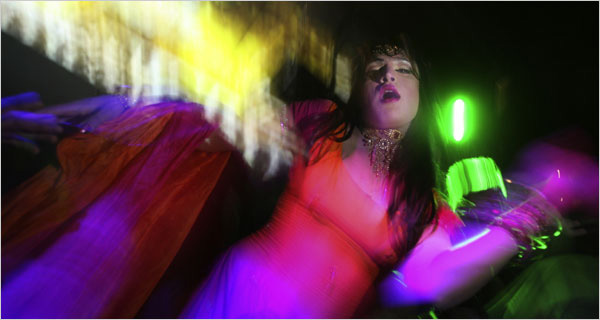
In the early morning hours, the D.J. blared remixed Indian folk tunes that drew revelers onto the dance floor of the SoHo night club, gyrating their hips and clasping their arms behind their necks.As smoke was piped into the space, the Bollywood movie clips projected on a large overhead screen seemed to merge with the real-life version of Bollywood on the dance floor, populated by drag queens dressed in ankle-length skirts and sweaty young men in jeans.
This is the world of Desilicious, a monthly dance party held at Club Shelter on Varick Street, near the entrance to the Holland Tunnel, that has become a mainstay among many gay Indians and Pakistanis. (The name of the event is derived from the word “desi,” a colloquial term, meaning “from my country” in Urdu and Hindi, that is often used to refer to people from the subcontinent.)
For these South Asians, who trace their heritage to countries where homosexuality remains taboo, the parties offer a rare chance to express their sexuality in an environment that embraces their culture.
“The first time I came here, four years ago, I didn’t arrive until 2 a.m., I was so nervous,” said Kevin Dhaniram, a slender 29-year-old actor with spiky dark hair. “I was still struggling with coming out then. Seeing people from a similar cultural background made me feel more comfortable.”
On and off the dance floor, cabdrivers and hairdressers wearing sleeveless white T-shirts mingle with information technology specialists and private equity analysts in khakis. Revelers bond over Bollywood films that celebrate camp and fabulousness.
Ashu Rai, a health care marketer who was raised by Indian parents in the San Francisco Bay area, began the Desilicious parties a few months after 9/11 along with two friends: a Pakistani-born graphic designer named Atif Toor who grew up in Connecticut, and a Mumbai-born investment banker named Rajesh Parwatkar. The three, who are all in their 30s, already felt that many gay nightspots weren’t welcoming to Desis, and they were galvanized in the aftermath of the attacks. “South Asians were being regarded with suspicion, particularly Muslims,” Mr. Toor said. “It seemed important to provide a space that felt safe and empowering.”
The other night, as the dancing heated up, many of the partygoers removed their shirts, and a drag queen flung off her jeweled bodice. Drag queens have become fixtures at the parties, delighting the crowd with live versions of Bollywood dances. One drag queen, a freelance makeup artist named Zeena Diwani, had spent two hours preparing her outfit, which included a hand-embroidered green skirt, a large butterfly hair clip and gold metallic eyelashes.
“A diva loves color, baby,” she explained, kicking a stiletto-heeled cowboy boot in the air.
Alexandra Starr |